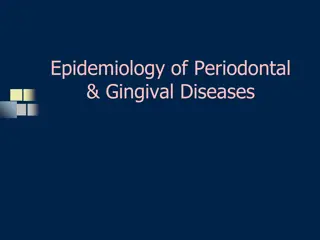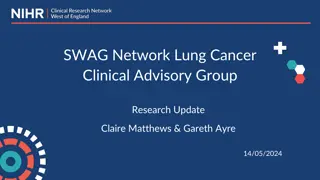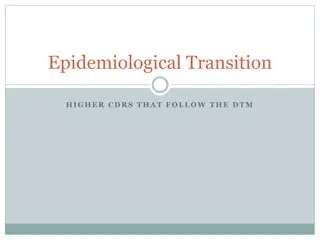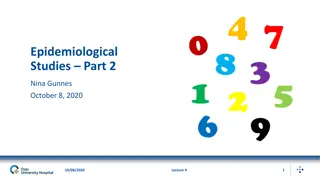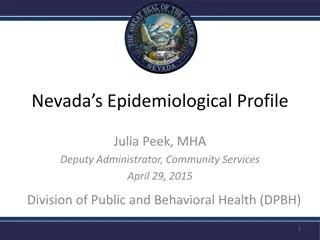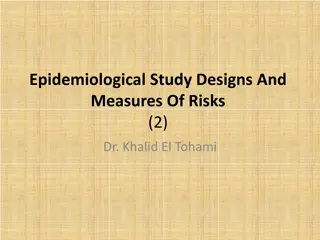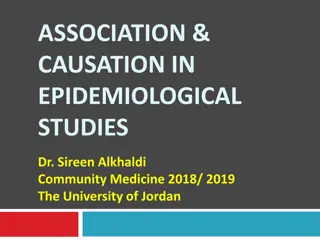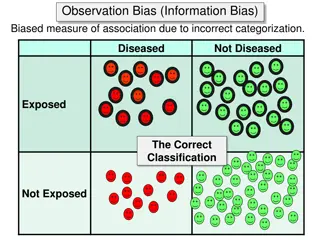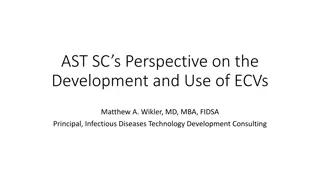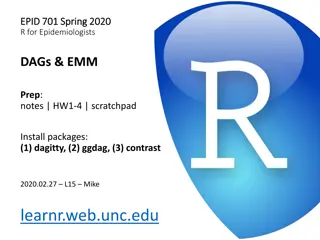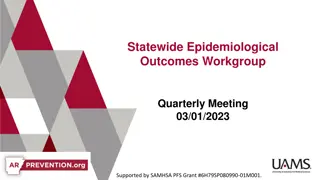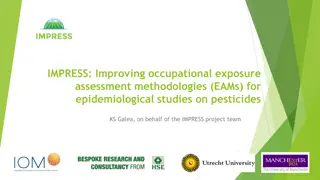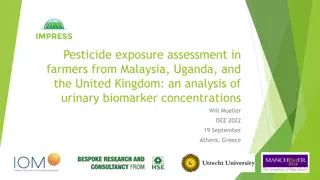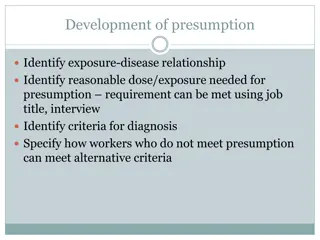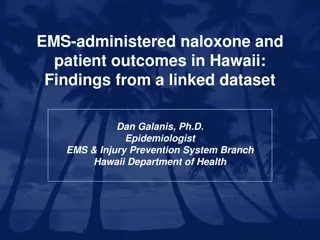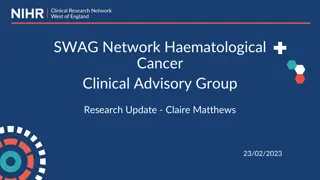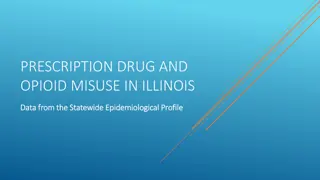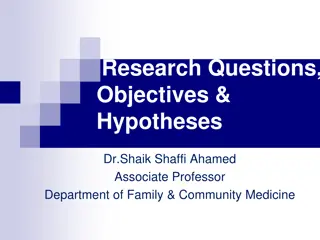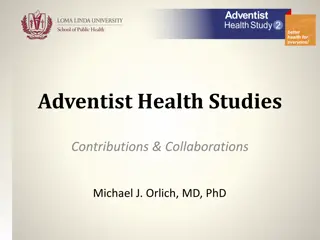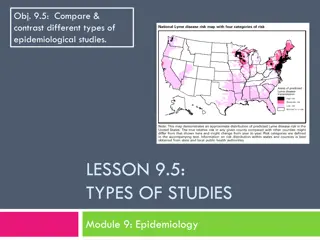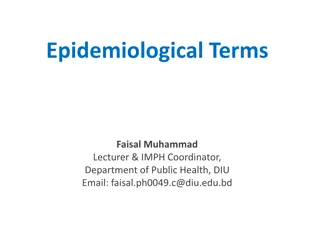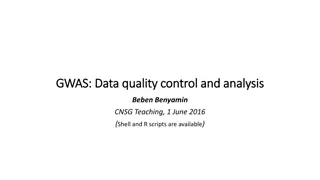Regional Epidemiological Situation of Dengue, Zika, and Chikungunya in 2023
Detailed report on the prevalence of mosquito-transmitted diseases like Dengue, Zika, and Chikungunya in South America in 2023. The document provides statistics on the number of cases, incidence rates, and fatalities reported in countries like Bolivia, Brazil, Paraguay, and Argentina. Additionally,
1 views • 54 slides
Current Situation of Dengue and Chikungunya Outbreak in Buenos Aires, April 10, 2023
The current situation report covers the outbreak of dengue and chikungunya in the Ciudad Autónoma de Buenos Aires as of April 10, 2023. It provides epidemiological data at both regional and national levels, detailing the cases reported, outbreaks, and preventive measures taken in the affected areas
2 views • 51 slides
Epidemiology of Periodontal & Gingival Diseases
Epidemiology is the study of disease distribution and determinants in populations for effective control and prevention. It plays a crucial role in understanding the prevalence, risk factors, and effectiveness of preventive measures for periodontal and gingival diseases. Classification systems and th
3 views • 63 slides
Global Measles and Rubella Update - April 2024
The Global Measles and Rubella Report provides provisional data on the reported cases of measles and rubella, distributed monthly via email. Official numbers are available in July each year through the WHO/UNICEF annual data collection. The report is based on surveillance data from Member States, wi
7 views • 62 slides
Latest Research and Studies on Lung Cancer - Update May 2024
This research update includes information on national recruitment to lung cancer studies, comparison of national vs. regional recruitment, and detailed descriptions of various studies and trials related to lung cancer. The studies cover areas such as treatment advancements, observational studies, ma
2 views • 13 slides
Colorado State Epidemiological Profiles - Substance Abuse Trends & Response Task Force
The Colorado State Epidemiological Profiles provide a state-level overview of data from various surveillance sources for prevention, intervention planning, monitoring, and evaluation. The profiles cover demographics, alcohol, marijuana, opioids, sustainability, and next steps. Updated every 2 years,
0 views • 12 slides
Understanding the Epidemiological Transition Stages
The Epidemiological Transition model explains shifts in causes of death at different stages of demographic transition. From pestilence and famine to delayed degenerative diseases, each stage highlights key factors influencing mortality patterns. By recognizing these transitions, healthcare professio
0 views • 8 slides
Overview of Cohort Studies in Epidemiology
Cohort studies are a type of observational study where a group of healthy subjects is followed over time to investigate relationships between exposures and outcomes. They provide valuable insights into disease development and risk factors, offering advantages like assessing multiple exposures and en
0 views • 21 slides
Understanding Epidemiological Profiles in Public Health Practice
Epidemiological profiles play a crucial role in substance abuse and mental health planning, helping professionals prioritize issues and raise awareness. The profiles include quantitative and qualitative data to analyze behavioral risk factors, consumption patterns, and clinical outcomes, sourced fro
1 views • 13 slides
FDA Perspective on Epidemiological Cut-off Values (ECVs)
The FDA presents insights on the development and use of Epidemiological Cut-off Values (ECVs) to distinguish wild-type populations from those with acquired resistance mechanisms. ECVs are crucial for determining antimicrobial susceptibility and guiding treatment decisions. The process involves analy
0 views • 13 slides
Understanding Epidemiological Study Designs and Measures of Risks
This informative content covers various epidemiological study designs, including observational and experimental studies, clinical trials, cohort studies, and more. It explains the concept of cohorts, indications for cohort studies, and the design considerations involved. Images are included to illus
6 views • 41 slides
Understanding Association and Causation in Epidemiological Studies
Exploring the concepts of association and causation in epidemiological studies, this content delves into the complexities of determining if exposure leads to disease risk. It discusses different types of associations, such as spurious, indirect, and direct causal associations, illustrating the chall
5 views • 43 slides
UK Acromegaly Register: Past, Present, and Future Research Overview
The UK Acromegaly Register (UKAR) is a long-standing project initiated in 1997 to gather data on patients with acromegaly in the UK. Led by Dr. Claire Higham, the register aims to provide epidemiological insights into the long-term outcomes of acromegaly patients undergoing different treatments. It
1 views • 15 slides
Overview of Media Studies Disciplines and Historical Development
Media studies is a multidisciplinary field that explores the content, history, and effects of various media, with roots in the relationship between media and culture. Originating in the 1920s, media studies draws on traditions from social sciences and humanities, incorporating theories from discipli
5 views • 18 slides
Types of Bias in Epidemiological Studies
Bias in epidemiological studies can arise from misclassification of observations and exposures, leading to incorrect associations between variables. Observation bias, misclassification bias, and non-differential misclassification can impact the accuracy of study results, either minimizing difference
1 views • 11 slides
Understanding Clinical Trials: Types and Designs
Clinical trials are essential research studies that evaluate new tests and treatments to improve human health outcomes. They involve various phases, designs, and purposes, such as treatment trials, prevention trials, and observational studies. Different types of clinical trial designs include experi
7 views • 18 slides
Overview of Epidemiological Cutoff Values (ECVs) in Antimicrobial Susceptibility Testing
Epidemiological Cutoff Values (ECVs) are crucial in determining antimicrobial susceptibility by distinguishing wild-type and non-wild-type microbial populations. ECVs are defined based on factors like minimal inhibitory concentration (MIC) and genetic variation, and are determined through specific m
0 views • 16 slides
Understanding Inverse Probability Weights in Epidemiological Analyses
In epidemiological analyses, inverse probability weights play a crucial role in addressing issues such as sampling, confounding, missingness, and censoring. By reshaping the data through up-weighting or down-weighting observations based on probabilities, biases can be mitigated effectively. Differen
0 views • 25 slides
Understanding Directed Acyclic Graphs (DAGs) for Causal Inference
Directed Acyclic Graphs (DAGs) play a crucial role in documenting causal assumptions and guiding variable selection in epidemiological models. They inform us about causal relationships between variables and help answer complex questions related to causality. DAGs must meet specific requirements like
1 views • 63 slides
Statewide Epidemiological Outcomes Workgroup Quarterly Meeting Overview
This overview captures the key discussions of the Statewide Epidemiological Outcomes Workgroup Quarterly Meeting. Topics included the NSDUH, Monitoring the Future survey, Youth Risk Behavioral Surveillance Survey, Arkansas Department of Human Services Annual Report, and Crime Information Center data
1 views • 9 slides
Enhancing Pesticide Exposure Assessment for Epidemiological Studies
Focuses on IMPRESS project aiming to improve methodologies for assessing occupational pesticide exposure in epidemiological studies. Reviews challenges in retrospective exposure assessment, proposes methodologies, and presents key project results to date, emphasizing the use of various exposure asse
1 views • 15 slides
Pesticide Exposure Assessment in Farmers from Malaysia, Uganda, and the United Kingdom
This study evaluates the impact of pesticide exposure on farmers' health in Malaysia, Uganda, and the UK using urinary biomarker concentrations. Multiple cohorts are analyzed to assess associations between exposure-modifying factors and urine metabolite measurements. The IMPRESS project focuses on i
0 views • 12 slides
Development of Presumption Criteria for Solvent-Induced Hearing Loss
Development of a presumption criteria by the Department of Labor (DOL) for identifying the exposure-disease relationship in cases of solvent-induced hearing loss. The DOL requires a diagnosis of sensorineural hearing loss in both ears, exposure to specific solvents, and a history of working in desig
0 views • 7 slides
EMS-Administered Naloxone and Patient Outcomes in Hawaii: Epidemiological Study
This study presents findings from a linked dataset analyzing EMS-administered naloxone and patient outcomes in Hawaii from 2012-2016. Part 1 covers basic epidemiological descriptions and linkage to hospital billing data, while Part 2 investigates associations between EMS response times and patient o
0 views • 14 slides
Hematological Cancer Clinical Studies Update and Recruitment Statistics
Latest update on hematological cancer clinical studies from the SWAG.Network Haematological Cancer Clinical Advisory Group, including national recruitment data, regional recruitment comparisons, open studies, and sample size information for ongoing studies. This comprehensive update covers a range o
0 views • 14 slides
Prescription Drug and Opioid Misuse in Illinois Epidemiological Profile
Explore the Illinois Statewide Epidemiological Profile on Prescription Drug and Opioid Misuse, developed by the Illinois Statewide Epidemiological Outcomes Workgroup and funded by Substance Abuse and Mental Health Services Administration. The profile covers consumption, prevalence, contributing fact
0 views • 28 slides
Advances in Baryon Spectroscopy and Hadronic Matter Studies
Discussions at the meeting focused on interpreting HADES results for e+e- and meson production in hadronic reactions, with studies involving proton, pion, light, and heavy ion beams. The role of time-like electromagnetic transitions, baryon spectroscopy, and connecting hadronic matter studies were e
0 views • 12 slides
Understanding Targeted Clinical Investigation in Pharmacovigilance
Targeted clinical investigation plays a crucial role in pharmacovigilance by further evaluating significant risks identified in pre-approval clinical trials. This involves conducting pharmacokinetic and pharmacodynamic studies, genetic testing, interaction studies, and large simplified trials to ass
0 views • 12 slides
Concentration and Minor Requirements for Bachelor of General Studies (BGS)
Bachelor of General Studies (BGS) students at Northwestern State University of Louisiana must complete a concentration consisting of 36 hours, with a minimum of 12 hours at the 3000 and 4000 levels taken at NSU. The popular concentrations are Social Science, Computer & Natural Science, and Arts & Co
0 views • 9 slides
Exploring Pesticide Monitoring and Contamination Studies in Maine
Mary Tomlinson's work with the Maine Board of Pesticides Control includes past studies on groundwater and surface water monitoring, ongoing monitoring initiatives, and future collaborative studies. The State Law mandates residue surveys to identify possible contamination sources and develop a pestic
1 views • 55 slides
Formulation of Research Questions, Objectives, and Hypotheses in Epidemiological Studies
Explore the importance of defining research questions, objectives, and hypotheses in epidemiological research, illustrated through examples from studies on diabetes mellitus in Saudi Arabia. Understand the steps involved in crafting clear objectives and hypotheses to address public health challenges
0 views • 37 slides
Adventist Health Studies Contributions & Collaborations Overview
Adventist Health Studies have made significant contributions to understanding the health and longevity advantages of Seventh-day Adventists, particularly focusing on vegetarian diets and cardiovascular health. With a history spanning over 57 years and various cohort studies, these studies have provi
0 views • 12 slides
Understanding Epidemiological Studies and Their Importance in Public Health
Epidemiological studies are crucial in understanding the distribution and determinants of health events in populations. They encompass various types, such as descriptive and analytical epidemiology, focusing on factors contributing to diseases. Epidemiologists use statistical methods to study health
0 views • 14 slides
Understanding Epidemiological Terms in Public Health
Epidemiological terms such as infection, infestation, infectivity, infectiousness, and more are important in understanding the spread and control of diseases. This detailed guide by Faisal Muhammad covers key concepts in public health, including definitions, examples, and the importance of terms lik
0 views • 34 slides
Assessment of Epidemiological Capacity in 27 Big Cities: Key Findings and Implications
Delve into the recent assessment of epidemiological capacity in 27 major cities, with insights from experts Jessica Arrazola, Chrissie Juliano, and Meghan McGinty. Explore the objectives, results, and unique aspects of the assessment, shedding light on strategies to enhance public health service del
0 views • 46 slides
Colorado Epidemiological Profiles 2021 - Substance Use Data and Analysis
The 2021 Colorado Epidemiological Profiles provide in-depth data and analysis on substance use patterns, impacts, and demographics in Colorado. The profiles cover alcohol, marijuana, opioids, and tobacco, along with special considerations for populations like LGBTQ, veterans, tribal communities, unh
0 views • 19 slides
Epidemiology Concepts in Research and Analysis
Exploring important epidemiology concepts such as exposure, outcome, risk, confounders, effect measures, and more, this content delves into variable selection using Directed Acyclic Graphs (DAGs) for causal inference in research and analysis. Understanding these concepts is crucial for conducting ro
0 views • 37 slides
Building a Food Studies Center at Met College
Establishing a Food Studies Center at Met College, driven by the merging of Food and Wine courses with Gastronomy programs, aims to integrate hands-on and academic approaches to food studies. Drawing inspiration from existing models like the Culinaria Research Centre and the Center for Regional Agri
2 views • 8 slides
Understanding Experimental Studies in Epidemiology
Epidemiological studies and experimental studies play vital roles in understanding cause-and-effect relationships in research. Experimental studies involve manipulating independent variables and measuring dependent variables, with categories such as true experimental, quasi-experimental, and pre-exp
0 views • 22 slides
Understanding GWAS: A Brief Overview of Genetic Association Studies
GWAS, or Genome-Wide Association Studies, are a method used to map genes associated with traits or diseases by analyzing genetic markers throughout the genome. This process involves statistically testing the association between SNPs and traits using regression or chi-squared tests in a hypothesis-fr
0 views • 19 slides


